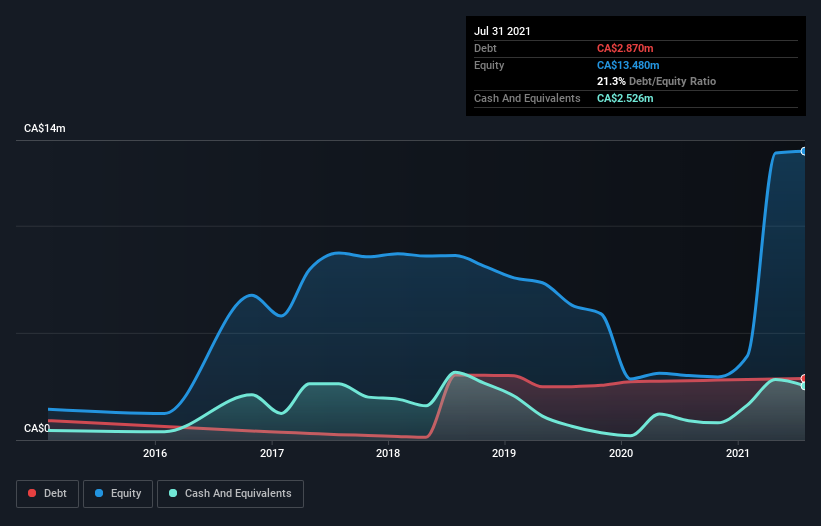The external fund manager backed by Berkshire Hathaway's Charlie Munger, Li Lu, makes no bones about it when he says 'The biggest investment risk is not the volatility of prices, but whether you will suffer a permanent loss of capital.' So it might be obvious that you need to consider debt, when you think about how risky any given stock is, because too much debt can sink a company. We note that Organic Garage Ltd. (CVE:OG) does have debt on its balance sheet. But is this debt a concern to shareholders?
Why Does Debt Bring Risk?
Debt and other liabilities become risky for a business when it cannot easily fulfill those obligations, either with free cash flow or by raising capital at an attractive price. Ultimately, if the company can't fulfill its legal obligations to repay debt, shareholders could walk away with nothing. However, a more frequent (but still costly) occurrence is where a company must issue shares at bargain-basement prices, permanently diluting shareholders, just to shore up its balance sheet. Of course, plenty of companies use debt to fund growth, without any negative consequences. When we examine debt levels, we first consider both cash and debt levels, together.
View our latest analysis for Organic Garage
What Is Organic Garage's Debt?
The chart below, which you can click on for greater detail, shows that Organic Garage had CA$2.87m in debt in July 2021; about the same as the year before. However, it also had CA$2.53m in cash, and so its net debt is CA$343.6k.

How Strong Is Organic Garage's Balance Sheet?
We can see from the most recent balance sheet that Organic Garage had liabilities of CA$2.46m falling due within a year, and liabilities of CA$10.8m due beyond that. Offsetting these obligations, it had cash of CA$2.53m as well as receivables valued at CA$392.4k due within 12 months. So its liabilities total CA$10.4m more than the combination of its cash and short-term receivables.
While this might seem like a lot, it is not so bad since Organic Garage has a market capitalization of CA$27.1m, and so it could probably strengthen its balance sheet by raising capital if it needed to. But it's clear that we should definitely closely examine whether it can manage its debt without dilution. But either way, Organic Garage has virtually no net debt, so it's fair to say it does not have a heavy debt load!
We measure a company's debt load relative to its earnings power by looking at its net debt divided by its earnings before interest, tax, depreciation, and amortization (EBITDA) and by calculating how easily its earnings before interest and tax (EBIT) cover its interest expense (interest cover). Thus we consider debt relative to earnings both with and without depreciation and amortization expenses.
Given net debt is only 0.24 times EBITDA, it is initially surprising to see that Organic Garage's EBIT has low interest coverage of 0.93 times. So while we're not necessarily alarmed we think that its debt is far from trivial. Notably, Organic Garage's EBIT launched higher than Elon Musk, gaining a whopping 203% on last year. The balance sheet is clearly the area to focus on when you are analysing debt. But it is Organic Garage's earnings that will influence how the balance sheet holds up in the future. So if you're keen to discover more about its earnings, it might be worth checking out this graph of its long term earnings trend.
Finally, a company can only pay off debt with cold hard cash, not accounting profits. So we always check how much of that EBIT is translated into free cash flow. Looking at the most recent two years, Organic Garage recorded free cash flow of 31% of its EBIT, which is weaker than we'd expect. That's not great, when it comes to paying down debt.
Our View
Organic Garage's interest cover was a real negative on this analysis, although the other factors we considered were considerably better. There's no doubt that its ability to to grow its EBIT is pretty flash. Considering this range of data points, we think Organic Garage is in a good position to manage its debt levels. Having said that, the load is sufficiently heavy that we would recommend any shareholders keep a close eye on it. The balance sheet is clearly the area to focus on when you are analysing debt. However, not all investment risk resides within the balance sheet - far from it. For instance, we've identified 4 warning signs for Organic Garage (2 don't sit too well with us) you should be aware of.
If you're interested in investing in businesses that can grow profits without the burden of debt, then check out this free list of growing businesses that have net cash on the balance sheet.
New: AI Stock Screener & Alerts
Our new AI Stock Screener scans the market every day to uncover opportunities.
• Dividend Powerhouses (3%+ Yield)
• Undervalued Small Caps with Insider Buying
• High growth Tech and AI Companies
Or build your own from over 50 metrics.
This article by Simply Wall St is general in nature. We provide commentary based on historical data and analyst forecasts only using an unbiased methodology and our articles are not intended to be financial advice. It does not constitute a recommendation to buy or sell any stock, and does not take account of your objectives, or your financial situation. We aim to bring you long-term focused analysis driven by fundamental data. Note that our analysis may not factor in the latest price-sensitive company announcements or qualitative material. Simply Wall St has no position in any stocks mentioned.
Have feedback on this article? Concerned about the content? Get in touch with us directly. Alternatively, email editorial-team (at) simplywallst.com.
About TSXV:OG.H
Oragin Foods
Owns and operates grocery stores that sell natural and organic products to consumers in Canada.
Low with weak fundamentals.
Market Insights
Community Narratives



